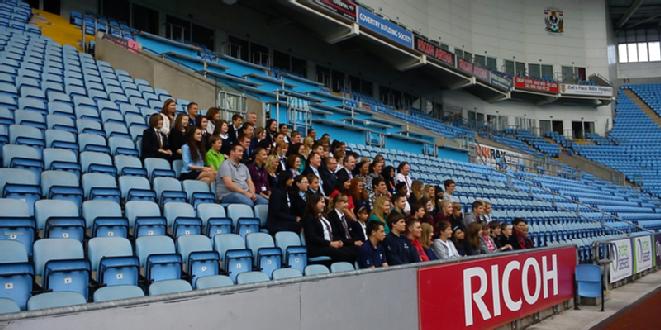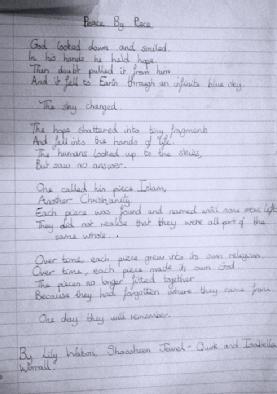Equality Workshop
I delivered a workshop at the United through Diversity Conference (Sept 2012) held at the Ricoh Arena, Coventry, with Yr 9 pupils from all regions of the Local Education Authority. The preliminary aim of the conference was to unite the Authority with its distinct socio-economic bands through the children by considering 6 protected characteristics - age, disability, gender reassignment, race, religion or belief, and sexual orientation.

I raised the following discussion topics for the KS 3 Gender group:
Gender identity and life choices from stories
1. What is the biggest gender issue in society as a whole and in schools and in the classroom?
2. What changes in education are taking currently taking place in schools in respect of equal opportunities? Why and by whom are they being introduced?
3. Where do you see yourself in five years and ten years time? How will the two positions reflect your financial position and status in society?
4. Can you describe what are the relationships between story and life? What are the gender implications if any?
5. How are stories able to help responses to oppression (i.e. dominant influences), resist conformation and of being silenced, and provoke the untold?
6. What judgements to moral dilemmas do the stories that you enjoy evoke, what limitations do they create, what certainties do they guarantee?
7. With the life experience that you have gained, what stories do you think would be most beneficial to share with young children today in preparation for their future family and career choices?
The Gender group then performed a play to show the benefit for both boys and girls if positive strategies were adopted within schools.
Introduction: Q - What do we want? A - Gender Equality
Need to change opinions now so gender equality is accepted in society, especially in the following areas:
- Sport - rugby, dance - open opportunities within all sections in sport. This year was the first time women competed in boxing in the Olympics, making it for the first time a zero all-male sports event since 776 BC. Boxing paradoxically is a violent full-contact sport but essential for self-defence and establishing authority. All this makes for a better all-rounded society.
- Clothing/fashion - Boys and girls should be able to wear shorts to school in the summer, rather than either skirts or long trousers. Like girls, boys should have the freedom to cut their hair the length they choose. All this supports individual expression, with girls and boys being allowed to dress in practical rather than conformist ways. Clothes define who we are, they are also a means to hide behind. Self-esteem is greatly effected by them, for example brands and how this affects perceived status and personal value.
- Lessons - need to remove gendered bias towards specific subjects, such as girls and textiles and boys with woodwork.
- Clubs, societies and hobbies - e.g. singing. Cubs are often found to be a girl-only choral group and boy (keep-out) rap bands: only by advertising to the gender that these groups are not so popular with can these associations be challenged.
Conclusion: Raise awareness of the advantages of gender equality in society
Through the media and education to make it better for everyone.
Important messages can be delivered in Early Childhood, the sooner the better.
Important messages can be delivered in Early Childhood, the sooner the better.

